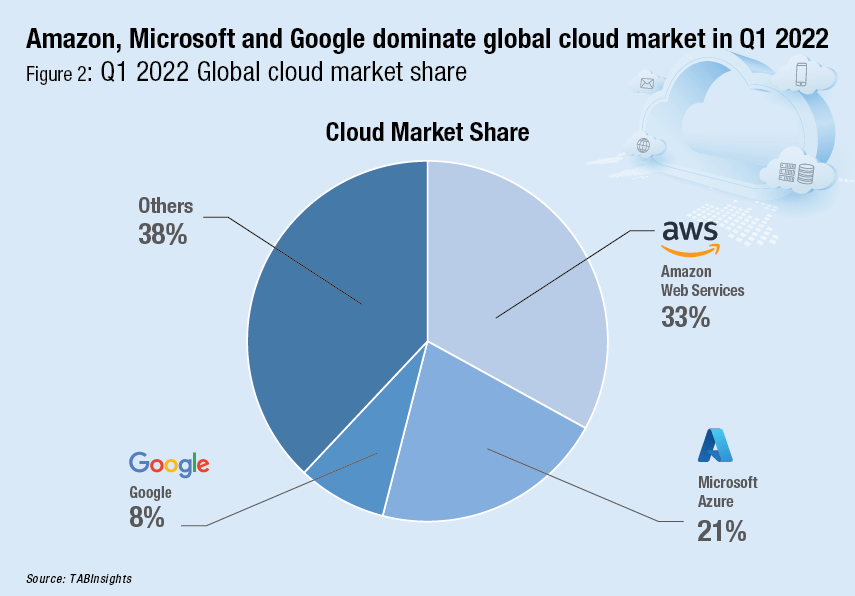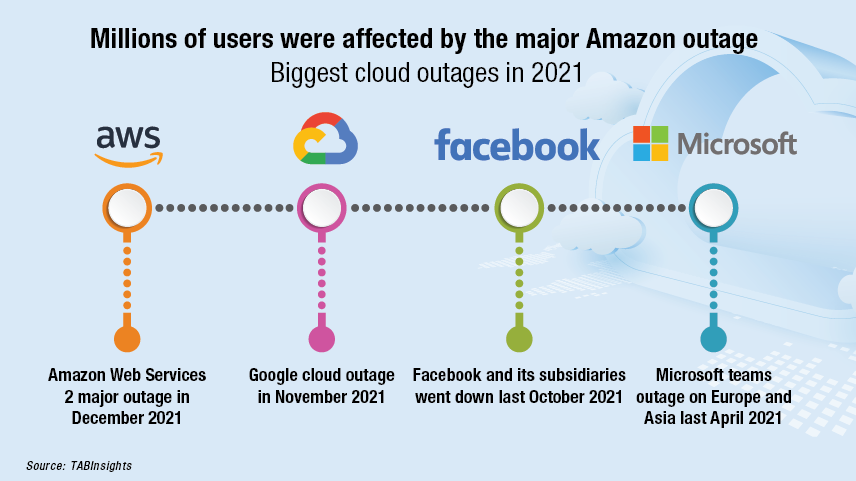- Major cloud outages and impact in 2021
- Amazon, Microsoft and Google dominate global cloud market in Q1 2022
- Future of cloud outages and cloud market
Major cloud services outages in 2021
The cloud is becoming a more popular tool for businesses. Companies put data in the hands of third-party cloud providers rather than keeping it on-site. However, cloud technology isn't perfect yet, and outages, while unusual, do happen. Any data stored in the cloud becomes unreachable during a cloud outage, and entire enterprises may be disabled as a result. That's why, despite owning 62% of the cloud market share, Amazon, Microsoft, and Google aren't immune to outages.
The numerous internet outages or disruptions in 2021 showed how interconnected and relatively vulnerable the internet ecosystem is. Two massive outages struck Amazon Web Services (AWS) in December 2021. Millions of users were affected by this outage in the USEAST1 region, including major online gaming sites such as Amazon, Amazon Prime, Amazon Alexa, Venmo, Disney +, Instacart, Roku, Kindle and several online gaming sites. Online services stopped. The outage also prevented apps that power warehouse, delivery, and Amazon Flex from working during the peak holiday shopping season. The AWS status dashboard determined that the root cause of the outage was a failure of multiple network devices.
Google Cloud went down in mid-November, and services such as Home Depot, Snapchat, Etsy, Discord, and Spotify stopped. The website went offline and when users tried to access the website, they got a "404" error. An outage has occurred due to a network configuration error. The two-hour break was apparently due to a reconfiguration of Google's cloud service load balancer. This isn't the first time Google Cloud has been hit, and probably not the last. Many non-Google companies take their websites offline and replace them with Google 404 pages. This is the most recent outage in 2021, this time collateral damage on Google Cloud, and many companies rely on hosting.
Microsoft reported that a DNS issue caused an outage affecting cloud services such as Azure, Teams, and Dynamics 365 on April 2021. According to Microsoft, the problem was completely resolved around 6:30 pm and around 10:30 pm. "We apologise for the impact of this outage," Microsoft said on the Azure status history page. "We are continuing to investigate to determine the cause, and details will be announced within the next 24 hours." This is two of other major Microsoft services such as Azure and the widely used collaboration app Teams.

Amazon, Microsoft and Google dominate global cloud market in Q1 2022
In Q1 2022, AWS, Microsoft, and Google combined captured 62% of global cloud computing spend, outgrowing their competition to the point where competitors had only small areas to investigate. The cloud grew by 34% year over year. AWS, Microsoft, and Google came in first, second, and third, respectively. Smaller clouds service providers grow at a 10-20% lower rate. Smaller clouds' slower growth indicates that their collective market share is declining, but this does not imply that they are profitable. Smaller companies' revenues have increased by over 150% since the first quarter of 2018, but their combined market share has dropped from 48% to 36%, implying that giant clouds are earning more than smaller market institutions.
Although this is still an expanding market with plenty of opportunities, smaller clouds must now concentrate on regional or service niches to differentiate themselves from the big three. This is unlikely to be encouraging news for companies like Oracle and IBM, which seek to be full-service clouds in the infrastructure as a service, hosted private cloud, and platform areas. While competition is fierce, Amazon, Microsoft, and Google continue to dominate the massive and quickly developing cloud sector. Other cloud providers simply cannot compete with the market leaders' scale and geographic reach.

Future of cloud outages and cloud market
While outages are sometimes unavoidable, organisations can still operate normally. Cloud infrastructure control must be improved by providers. The objective is to avoid single points of failure and have a backup for every critical component that could fail. This is especially important given that the worst outages in 2021 were caused by internal rather than external factors. Furthermore, firms must have a plan in place to deal with any cloud disruptions. A backup plan would kick in until the issue was resolved, because a single node can overturn an entire system. Another crucial step would be to offer offline support and functionality for cloud-based technology services to ensure continuous functioning in the event of an outage.
Cloud outages have a minor impact on the market share of cloud services. Customers and their reputation are the ones that suffer as a result of this. Although the financial consequences of an outage are obvious, businesses must practice excellent crisis management.




All Comments